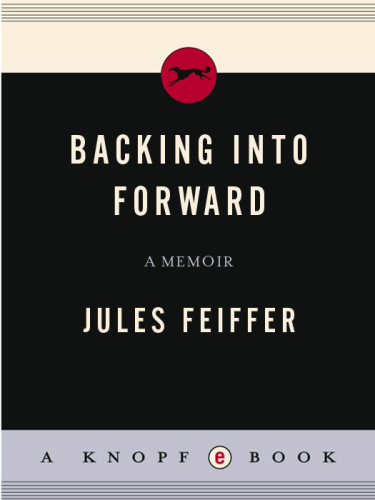
Backing Into Forward
A Memoir
کتاب های مرتبط
- اطلاعات
- نقد و بررسی
- دیدگاه کاربران
نقد و بررسی

Starred review from November 30, 2009
Before Feiffer received a 1986 Pulitzer Prize for editorial cartooning, his animated Munro
won an Oscar in 1961. His career encompassed everything from comic strips (Village Voice
; Playboy
), novels (Ackroyd
) and plays (Little Murders
) to children's books (Bark
; George
), nonfiction (The Great Comic Book Heroes
) and screenplays (Carnal Knowledge
; Popeye
). Retracing his path of past creative pursuits, he takes anecdotal detours to introduce the talented people he met along the way. As a kid (he was born in 1929), drawing comic strip characters on the sidewalk was a way to avoid Bronx bullies: “I was never not afraid.” Serving an apprenticeship with cartoonist Will Eisner, he felt he was a fraud (“My line was soft where it should be hard, my figures amoebic when they should be overpowering”), so he instead graduated to ghostwriting Eisner's The Spirit
. His account of hitchhiking cross-country invades Kerouac territory, while his ink-stained memories of the comics industry rival Michael Chabon's Pulitzer Prize–winning fictional portrait. Two years in the military gave Feiffer fodder for the trenchant Munro (about a child who is drafted). Such satirical social and political commentary became the turning point in his lust for fame, which finally happened, after many rejections, when acclaim for his anxiety-ridden Village Voice
strips served as a springboard into other projects. Writing with wit, angst, honesty, and self-insights, Feiffer shares a vast and complex interior emotional landscape. Intimate and entertaining, his autobiography is a revelatory evocation of fear, ambition, dread, failure, rage, and, eventually, success.

November 15, 2009
In characteristically wry tones, the celebrated cartoonist/playwright/illustrator looks back at a six-decade (and counting) working life, paying particular attention to his early influences.
First among these are the comic strips and superhero comics that Feiffer (Passionella and Other Stories, 2006, etc.) read and copied in his Bronx youth; he pays warm tribute to their creators throughout his memoir. Second—and looming so large that she practically becomes the protagonist in major portions of the book—is his mother (his father rates only a few passing mentions), a notably insensitive figure who, he writes,"never failed to fail me." She did, however, wean her son of any need to rely on the approval or judgments of others in his work, politics or private life. With chapter heads like"Lucking Into The Zeitgeist" and"Heckle and Jeckel [sic] Meet Mike and Elaine," Feiffer retraces his career from a post–World War II apprenticeship in the studio of the legendary Will Eisner and the beginnings of a decades-long association with the Village Voice, to his establishment as a fixed star in the New York cultural firmament and a powerful voice of the New Left, to his most recent turn as a popular children's-book author. The author describes himself as a"hardworking, never-resting combination of talent and fraud," and he freely drops names and opinions ("Now, I had loved Annie Hall, and I used to like Woody"), which create a winning portrait of his literary and artistic milieu. Feiffer dishes up a self portrait notable for authentically sudden switches from self-effacement to touchy pride, righteous anger to bemusement, vulnerability to urbane loftiness.
A touching, penetrating memoir—though far too sparsely illustrated.
(COPYRIGHT (2009) KIRKUS REVIEWS/NIELSEN BUSINESS MEDIA, INC. ALL RIGHTS RESERVED.)

March 15, 2010
The Jewish Mother from Hell would never have guessed that her wimpy kid had so much inside himmultiple personalities like Munro, Bernard, Passionella, Harry the Rat with Women, and the tireless Dancer. Feiffer had the moxie and the magic both to reflect and to define the neuroses of his uncomfortably self-aware generation as all the smugness of the postwar 1950s went aground on the Vietnam War, campus sit-ins, the sexual revolution, and the Civil Rights Movement. At age 80, Feiffer relishes his life story, remaining firmly convinced of his own greatness while still in awe that a Brooklyn scribbler sans degree should be hobnobbing with media darlings and New York's socioliterary intelligentsia. VERDICT There's not much here on the personal side or about his drawing techniques, but the juicy stories about the art and the networking and Feiffer's own brand of antichutzpah are so captivating that who cares? Over 40 cartoons are included but, alas, no photos and no chronology of publications, plays, and films. Indispensible for most public and all academic libraries.M.C.
Copyright 2010 Library Journal, LLC Used with permission.

Starred review from March 1, 2010
Feiffer is masterful at self-analyzing the skinny Jewish kid from the Bronx who grew up during the Depression, whose sister was a Communist, and whose distant cousin Roy Cohn was a Red-baiter, while he himself was full of insecurities but fortunate enough to luck into the zeitgeist. Part of his fortune was a talent for drawing, which saved him from local bullies and an overbearing mother, offering him a venue for revealing himself. Now in his 80s, Feiffer looks back on a life and career of misdirection. His formative years were spent with legendary cartoonist Will Eisner and a society of comic strip roustabouts. Service in the army made a satirist of him as he began to develop a wonderfully subversive tilt of mind. Living in Greenwich Village, he suffered years of rejection before landing at the Village Voice in its infancy, where he worked for eight years with no pay but lots of exposure. With verve and, at times, speaking directly to the reader, Feiffer recalls life and work with Mike Nichols, Al Hirschfeld, Alan Arkin, Jack Nicholson, and others. He offers social commentary and memorable moments from career and family life as he moved from cartooning to screen and playwriting, to authoring childrens books, all the while maintaining a wry perspective that shows in the cartoons interspersed throughout this wonderful memoir.(Reprinted with permission of Booklist, copyright 2010, American Library Association.)

























دیدگاه کاربران